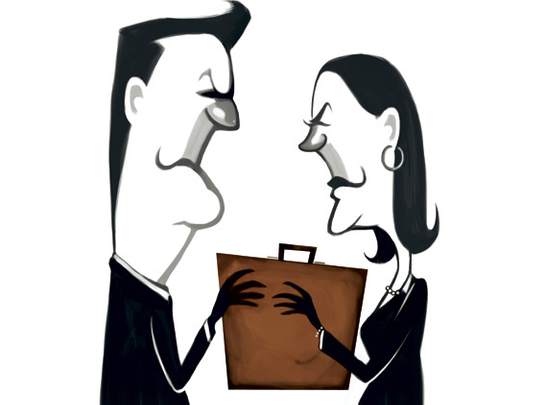
This month, Germany celebrated its 20th anniversary of reunification. Like any birthday present, it was received with joy when East and West merged in 1990.
But there was another amazing gift that the country has declined to accept over the past two decades: the mindset of 16 million emancipated citizens from the East who never questioned the idea that men and women can work regular full-time jobs while sharing equal responsibility for child care and education.
One of those 16 million people has made it into the Federal Chancellery. And it's a woman. When Angela Merkel took office in 2005, this was lauded as a signal that Germany was finally forging ahead as a country of equal opportunity for men and women to leadership positions. Instead, it brushed off the advantages of eastern German gender equality.
This is the picture today: While half of all business-school students are women, a mere 27 per cent of Germany's managers are female, and this number drops to 13 per cent when it comes to board membership at big enterprises. The European Union average is 30 per cent.
Only five women are on the group management boards of the 30 companies listed on Germany's benchmark DAX Index. Deutsche Telekom, E.ON, Merck, SAP and Siemens are the only ones that have seen the benefit of female representation at the highest level.
Torrent of reproaches
This is stunning news in terms of gender equality, particularly considering Germany has made little progress for the last 20 years. The country has developed an even bigger remuneration gap between men and women. It is true that this is still a problem in many countries. But while women in the EU earn an average of 18 per cent less than men do in the same jobs, Germany ratchets up the pay gap to almost 25 per cent. It isn't surprising that the EU Commission regularly directs a torrent of reproaches toward Germany.
EU Justice Commissioner Viviane Reding recently announced that there would be a law-enforced quota for women in management positions if things don't improve by the end of 2011. This instantaneously excited a wave of negative responses by male managers and the conservative press.
There seem to be few worries Germany has slipped a notch to position No 13 (behind Lesotho and the Philippines) in the latest "Global Gender Gap Report 2010" compiled by the World Economic Forum.
Why is Germany making so little progress in gender equality? Senior managers ignore the body of research showing that women act as corporate- and financial-performance drivers. The country's political leaders underestimate the foreseeable gap of a staggering 24 million in the European workforce, which Germany could help fill if the female participation rate rises.
There are a couple of reasons for the lack of progress. First, Germany isn't always the open-minded country it pretends to be. The idea of a working mother being a "Rabenmutter" (uncaring mother) — a word lacking its equivalent in the rest of Europe — is still prevalent, even in well-educated circles. Talking to senior management in Germany, one quickly realises that "secretary" is still the only professional position that women in the company fill.
If women are to enjoy genuine support and be equal contenders for careers in senior management, there is a dire need for a major cultural change in Germany that includes new models of equal parenting, modern concepts for state-supported child day care and flexible working times. Without this change, families led by parents with equal obligations and opportunities won't become a reality.
Jobs for boys
Also, with too few women in top positions the routine of male self-selection for such positions is perpetuated. As many senior managers, including the few female ones, still live and work in a male-dominated environment, they tend to rely on their peers when promoting people.
If this self-sustaining process is to be disrupted, more female managers are urgently needed. They would offer two benefits: They would promote qualified women applying for the same positions as their male counterparts. And men would slowly get used to being surrounded not just by their own kind, but also by competent women.
Finally, women need some of those role models that men could always rely on. Female employees will refrain from aiming for senior-management jobs as long as the path is seen as a horror trip where you bang your head against glass ceilings, are viewed as a bad mother and treated like an alien in a skirt.
In 2008, Norway enforced a female quota for corporate boards, and the number of women board members has since increased to 40 per cent. At a recent discussion on Norway's policy as a possible role model for Europe, an entrepreneurial woman from eastern Germany had to admit that gender equality hadn't become the modus operandi for a unified Germany. Having rejected the big present of emancipation in 1990, Germany might have to finally enforce it by law.
Miriam Meckel is the managing director of the Institute for Media and Communications Management at the University of St. Gallen in Switzerland, and a faculty associate at the Berkman Centre for Internet and Society at Harvard University. The opinions expressed are her own.












